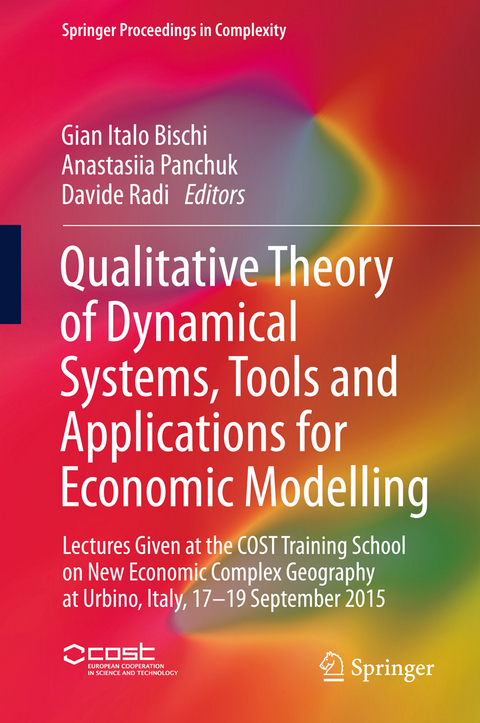
Qualitative Theory of Dynamical Systems, Tools and Applications for Economic Modelling
Springer International Publishing (Verlag)
978-3-319-33274-1 (ISBN)
The book presents the lectures delivered during a short course held at Urbino University in summer 2015 on qualitative theory of dynamical systems, included in the activities of the COST Action IS1104 "The EU in the new economic complex geography: models, tools and policy evaluation". It provides a basic introduction to dynamical systems and optimal control both in continuous and discrete time, as well as some numerical methods and applications in economic modelling.
Economic and social systems are intrinsically dynamic, characterized by interdependence, nonlinearity and complexity, and these features can only be approached using a qualitative analysis based on the study of invariant sets (equilibrium points, limit cycles and more complex attractors, together with the boundaries of their basins of attraction), which requires a trade-off between analytical, geometrical and numerical methods. Even though the early steps of the qualitative theory of dynamical systems have been incontinuous time models, in economic and social modelling discrete time is often used to describe event-driven (often decision-driven) evolving systems.
The book is written for Ph.D. and master's students, post-doctoral fellows, and researchers in economics or sociology, and it only assumes a basic knowledge of calculus. However it also suggests some more advanced topics.
Qualitative Methods in Continuous and Discrete Dynamical Systems.- Some Aspects on Global Analysis of Discrete Time Dynamical.- Dynamical Analysis of Cournot Oligopoly Models: Neimark-Sacker bifurcation and Related Mechanisms.- Some Dynamical Models in Regional Economics: Economic Structure and Analytic Tools.- Dynamic Modeling in Renewable Resource Exploitation.- Dynamic Models of Financial Markets with Heterogeneous Agents.- A Dynamical Model of Proximal Development: Multiple Implementations.
| Erscheinungsdatum | 08.10.2016 |
|---|---|
| Reihe/Serie | Springer Proceedings in Complexity |
| Zusatzinfo | XVI, 327 p. 171 illus., 41 illus. in color. |
| Verlagsort | Cham |
| Sprache | englisch |
| Maße | 155 x 235 mm |
| Themenwelt | Mathematik / Informatik ► Mathematik ► Angewandte Mathematik |
| Naturwissenschaften ► Geowissenschaften ► Geografie / Kartografie | |
| Naturwissenschaften ► Physik / Astronomie ► Optik | |
| Naturwissenschaften ► Physik / Astronomie ► Theoretische Physik | |
| Sozialwissenschaften ► Soziologie | |
| Wirtschaft ► Allgemeines / Lexika | |
| Schlagworte | Complex Economic Geography • Complex Economic Systems • Continuous-time Dynamical Systems • COST Action IS1104 • Data-driven Science, Modeling and Theory Building • Decision-driven Evolving Systems • Discrete-Time Dynamical Systems • Dynamical Systems and Optimal Control • Economic Dynamics • Economic Geography • Economic Theory/Quantitative Economics/Mathematica • Event-driven Evolving Systems • Geocomplexity Proceedings • Nonlinear Dynamics • Nonlinear Socioeconomic Dynamics • Physics and Astronomy • Regional and Spatial Economics • Regional/Spatial Science • Socio- and Econophysics, Population and Evolutiona |
| ISBN-10 | 3-319-33274-0 / 3319332740 |
| ISBN-13 | 978-3-319-33274-1 / 9783319332741 |
| Zustand | Neuware |
| Haben Sie eine Frage zum Produkt? |
aus dem Bereich


